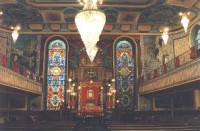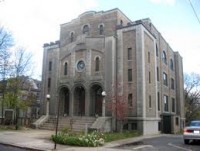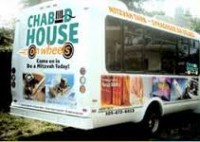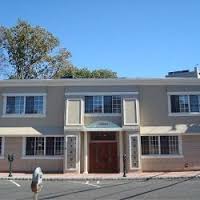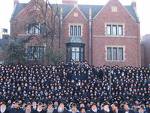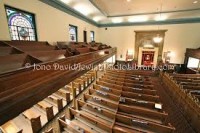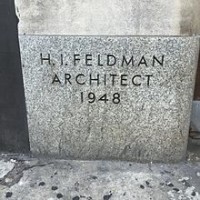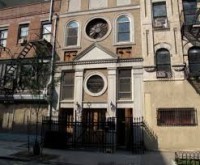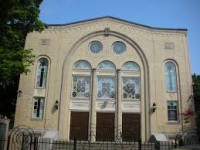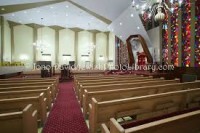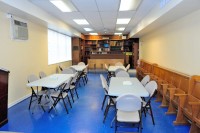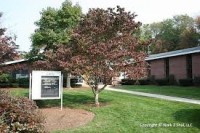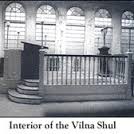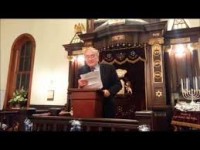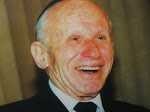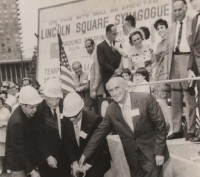Weekly Shiurim:
Rav Singer Chevra Mishnayos Shiur: Daily between Mincha & Maariv
Mishna Berura Yomis: Daily after Maariv
Daf Yomi by Rabbi Fishelis: Sun – Thu at 8:00 PM
Mishlei Shiur: Sunday mornings, 7:45 AM
Women's Shiur in Tehillim: Monday
Rabbi Romm's Ha'amek Davar Shiur for men and women: Wednesday at
9 PM
Torah Topics: given by Rabbi Mayer Friedman. Friday mornings, 9:15 – 10:15 AM
Shabbos Shiurim:
Rabbi Romm–1 hour before Mincha
Daf Yomi–1 hour before Mincha
The Bialystoker Synagogue was organized in 1865 on the Lower East Side of New York City. The Synagogue began on Hester Street, moved to Orchard Street, and then ultimately to its current location on Willet Street, more recently renamed Bialystoker Place.
Our congregation is housed in a fieldstone building built in 1826 in the late Federal style. The building is made of Manhattan schist from a quarry on nearby Pitt Street. The exterior is marked by three windows over three doors framed with round arches, a low flight of brownstone steps, a low pitched pedimented roof with a lunette window and a wooden cornice. It was first designed as the Willett Street Methodist Episcopal Church.
In the corner of the women’s gallery there is a small break in the wall that leads to a ladder going up to an attic, lit by two windows. Legend has it that the synagogue was a stop on the Underground Railroad and that runaway slaves found sanctuary in this attic.
In 1905, our congregation, at that time composed chiefly of Polish immigrants from the province of Bialystok, purchased the building to serve as our synagogue. During the Great Depression, a decision was made to beautify the main sanctuary, to provide a sense of hope and inspiration to the community. The synagogue was listed as a New York City landmark on April 19, 1966. It is one of only four early-19th century fieldstone religious buildings surviving from the late Federal period in Lower Manhattan. Richard McBee and Dodi-Lee Hecht have both written in-depth articles about the building.
In 1988 the Synagogue restored the interior to its original facade, and the former Hebrew school building was renovated and reopened as The Daniel Potkorony Building. It is currently used for many educational activities. Our most recent project was the refurbishing of our windows.
The Synagogue has continued to be a vibrant and reputable force in the religious world. In recent years a substantial number of new families have chosen to make it their place for prayer and study.
In 2013, we celebrated the 125th anniversary of the founding of the earliest of the Boston Synagogue’s predecessor shuls — Congregation Beth Jacob, founded in 1888. To celebrate this momentous occasion, the Synagogue Board formed an Archival/Historical Committee, which wrote a 260-page history book. It is the most authoritative history ever written about the synagogues of the West End. The book is available for purchase directly from the Synagogue, as well as on Amazon.com.
Much of what we have uncovered is quite fascinating and not widely known. Parts of it are funny — like the story of how some disgruntled Kosher butchers and a rejected suitor poisoned all 2,000 guests at the wedding of a rabbi’s daughter. Fortunately, no one died. We also interviewed former West End resident Leonard Nimoy, who among other things told us that the famous Vulcan salute comes from the priestly blessing that he observed as a teenager at one of our predecessor synagogue’s High Holiday services.
In some ways, the story of Boston Synagogue is the story of Boston generally: substantial growth due to immigration at the turn of the 20th century; followed by a long period of urban decline; then substantial resurgence as downtown Boston has become an increasingly attractive place for people to live. As such, we celebrate not just our synagogue, but also the entire downtown Boston community of which we are a part.
A few years ago, we established guidelines for adding artwork that complements the building’s modern design. We commissioned a new ark curtain designed by Joy Chertow, an art teacher at Solomon Schechter Day School in Newton, MA. The intricate and ornate quilting was done by Elana Schreiber, a science teacher at Schechter. The curtain was donated by Mark Schonfeld in memory of his late wife, Bobbie.
After numerous compliments about our ark curtain, we decided to commission a new wall hanging for our lobby entryway, in memory of our longstanding member Florence Wasserman. The Etz Hayim (tree of life) design with a representation of the city of Jerusalem, also designed by Joy Chertow, was chosen to represent the continuing attachment of generations of Jews worldwide to the land of Israel.
wallhangingAs part of our 125th anniversary, we created a high-resolution scan of the 1909 North Russell Street Mishna Society hand-illuminated cover page, and then created a set of enlargements from this work that now grace the sanctuary. It is a beautiful blend of the traditional and modern!
Start the year on a
HIGH note!
High Holiday Services at
Chabad House in Miami Beach
Rosh Hashana 5776 – 2015 – September 13 -15
Yom Kippur – Sept 22-23
Chabad invites you to a warm, traditional, uplifting, and meaningful High Holiday experience.
Our doors are open to all; no membership fees or tickets.
Warm, friendly and non-judgmental atmosphere
No background, affiliation or prior knowledge necessary.
Hebrew-English Holiday Prayer Books
Traditional services blended with contemporary messages
Prayer instructions throughout the service
Insights and explanations into the Prayers, practices and rituals and inspirational stories
Festive Holiday Meals
Reserve Now for Amazing Rosh Hashana Dinner
All services are free of charge Donations are encouraged and warmly appreciated
No tickets required. Reservations are appreciated for Services, required for Festive Holiday Meals.
Everyone is invited, and no one will be turned away for lack of funds. Main thing is you come, and we are waiting to see you!
We look forward to personally greeting you!
Rabbi Joshua Metzger – Executive Director
Rabbi Asher N. Webb – Kollel Director
Rabbi Levi Shmotkin – Young professionals
Rabbi Noach Heber – IAT Law and Chabad Relief NYC
Rabbi Shmuel Metzger – Upper Midtown Chabad
Mrs. Raizy Metzger – Chabad Preschool
Rabbi Yehuda Rader – Program Director
Rabbi Menachem Mendel Weisz – Assistant Rabbi
509 Fifth Ave Between 42nd and 43rd
New York City
Shachris morning service: Monday-Friday 7:45 A.M.
2nd Shachris Minyan Monday-Thursday 8:45 A.M.
Sundays (and major legal holidays) 9:30 A.M.
Mincha afternoon service: 1:45 P.M. Sunday-Friday (year- round)
Mincha/Maariv service: 4:15/4:30P.M. Sunday-Thursday
Maariv Evening Service: 5:45 p.m. Monday-Thursday
Shabbat Schedule at Chabad of Midtown Manhattan:
For Shabbat candle lighting times click here
Friday Night Service: Kabbalat Shabbat/Arvit 6:00 pm
Dinner: Following service
Shabbat Morning Service: 10:00 am
Kiddush Buffet: 12:30 pm
Chabad of Fort Lee is founded on the principle that, while Jews embrace many levels of observance in their personal lives, there should be a place for all Jews no labels, no affiliations. They develop a sense of community and enhance the experience of being Jewish. They have successfully catered to hundreds of families from all backgrounds, offering Jewish educational programming in an accepting and innovative setting where all feel welcome. The goal is to create a positive Jewish experience for everyone as they strengthen their ties to the Jewish community.
Chabad of of Fort Lee is a place where every Jewish person is welcome – regardless of affiliation or level of knowledge. Our sole purpose is to create a warm welcoming environment to explore and experience our heritage in a non-judgmental and inviting atmosphere.
Chabad:
There's a palpable warmth at our synagogue services that melts away any embarrassment for those unfamiliar with, or new to, communal prayer.
Everyone feels at home. Come feel for yourself the family atmosphere that makes our services such a delightful experience.
Growth. Connection.
Two little words that symbolize what Chabad of Fort Lee stands for. Two big words that tell you what's so special about us.
Many people come to study or pray at Chabad. They come from all sorts of backgrounds, have many different religious affiliations, and function at all levels of Judaic observance.
But there is one thing they have in common: they are on a journey of growth – personal, intellectual, emotional, religious. They seek to expand their Jewish horizons, increase their knowledge in areas of Judaism, and for some, to grow in Jewish observance.
Warmly, gently, humorously, humbly, but persistently, our Rabbi, Rabbi Konikov, a world class Rabbi and scholar, urges everyone onward and upward, based on the teachings of Chassidism and the Lubavitcher Rebbe, Rabbi Menachem Mendel Schneersohn, that every Jew is precious and important because he is a Jew, and endowed with a G‑dly soul. One more Torah class. Try out a mitzvah. Explore your roots, take one step further on the path of Judaism; tomorrow maybe another. What when how much and how fast is up to you. But take a step forward. As long one lives one must keep on growing.
But a person, like a plant, needs warmth to grow. Our Chabad is legendary for its warmth, its friendliness, its caring, its hospitality. The words shul family are so often used here, that they've actually become a cliche. The Chabad has become the true center of our community.
Chabad of the Upper East Side is part of a world-wide organazation of Chabad-Lubavitch, under the leadership and guidance of the Lubavitcher Rebbe, Rabbi Menachem Mendel Schneerson.
There is no mystery about our philosophy: Love every Jew; educate every Jew; reach out to help every Jew. We open our arms and hearts to all, regardless of education or affiliation. That is a commitment that we have honored on the Upper East Side since 1993
Synagogue
Friday Evening
Mincha & Maariv:
5 minutes after candle lighting
Shabbat
9:00 AM: Chassidic Philosophy
9:30 AM: Morning Services
10:30 AM: Reading of the Torah accompanied by penetrating Chassidic insights into the Torah and it's relevance to our personal lives
Kids Shul: 10:15 AM -12:15 PM
with Mrs. Rivkah Dayan
Followed by Kiddush
Mincha, Seuda Shlishit followed by
Evening services, Havdallah and The Living Torah.
Call for exact times.
Sunday & Legal Holidays
The Upper East Side Kollel
Learning: 8:30 AM
Morning Services: 9:00 AM
followed by breakfast and 1:1* learning until 1:30 PM
Monday-Friday
The Upper East Side Kollel
6:45 1:1 Learning
7:30 AM – Morning Services
followed by breakfast and 1:1* learning until 12:30 PM
Jewish Identity Grows On Manhattan's Upper East Side
Marlene Rosenberg, a successful senior business management consultant has been living around the corner from Chabad of the Upper East Side for as long as she can remember. But it was only in the past year that she took courage and ventured in gingerly, despite her fears that the experience would be too intimidating.
“Both my parents were Jewish, but we grew up with no real knowledge or Jewish traditions,” she said. “I didn’t read Hebrew, and knew nothing about how to participate at services.” When her sister died a year ago, the loss triggered a hunger, and Marlene was on a quest for something that would bring comfort and meaning to her life.
Of the estimated 56,000 Jews who live on Manhattan’s Upper East Side—the area bounded by the East River to Central Park and 59th Street to 96th Street—only 15,000 affiliate in some way.
“The UES has one of the wealthiest, most assimilated Jewish populations anywhere,” Rabbi Benzion Krasinianski, director with his wife Chanie, of Chabad of the UES, said. “But with this many Jews who don’t affiliate at all, the need and the possibilities are tremendous.” He recalls that when he moved to the area 21 years ago to establish Chabad of the UES, many thought he’d come to the wrong neighborhood.
“People told us frankly that they didn’t see how Chabad would be relevant to Jews here who have reached the summit of success in their careers; that they would have no interest in anything spiritual.” But some like Marlene, sensitive to an existential void that begs a different kind of answer, eventually find their way to Chabad of the UES on East 77th Street and First Avenue.
Others connect when they send their children to Chabad’s popular preschool which has grown to 75 children; or to its Hebrew School where at any given time, 50 adolescents are being prepared for their bar-bat mitzvahs.
Chabad facilities here include the $13 million Schneerson Center for Jewish Life sponsored by George Rohr & Family and the Jacques & Hanna Schwalbe Mikvah sponsored by Peter Schwalbe. The building, featuring a sanctuary, classrooms, commercial kitchen and social hall bookended by a beautiful, spa-like mikvah on its below-ground level that is used by 400 women a month, and an open-air playground on the roof, is bursting at the seams.
Peter Schwalbe recalls that when “we first started building about 12 years ago, I used to say to the rabbi: ‘What if we build this spectacular building and no one shows up?’” But they now have children on a waiting list for admission to the preschool because, he says, “there’s simply no room.”
The Krasinianskis, parents of a large family, deliver a standard of programming and services that often exceeds the expectations of Upper East Siders. “The Upper East Side is a trend setting community and has repercussions around the world. If mikvah is good enough for Park Avenue women, it must be good enough for everyone,” says Chanie.
Nicknamed 7:11 for opening its doors every morning shortly before 7 and closing at 11, the Chabad center sees hundreds of Jews on an average week and more than that participating in its varied and dispersed programs and services: besides the preschool and Hebrew school, it offers well attended adult education classes, a Kollel, daily prayer services, a Friendship Circle. Under the Krasinianski’s leadership, Chabad on the UES has opened Chabad of Hunter College, Chabad Israel Center of the UES, Chabad Young Professionals, and most recently, Chabad’s Medical Outreach program.
Owing to the largest concentration of world class hospitals, including Sloan Kettering, Columbia Presbyterian, Cornell, Lenox Hill, and Mt. Sinai, the Krasinianski’s recently decided to recruit a young couple dedicated to serving this sector.
“We are often called upon by people who end up here unexpectedly, traumatized by a sudden medical crisis. They need someone to turn to, to lean on, who can help them out with medical referrals, Shabbos accommodations, sometimes with language barriers.”
In addition, Chabad’s designer thrift shop, Solomon's Wive's Designer Resale & Thrift on East 89th Street, brings people together for a good cause. Managed by Donna Pressman, who helped Mussa Zakon set up the thrift shop, the store’s proceeds go to support Chabad’s educational and social activities. The shop, says Pressman, is “where we take the material and turn it into something spiritual.”
But above all, says Rabbi Krasinianski, Chabad is here to teach Torah. “There is a real thirst—even among a more traditional element—for Chasidic study. People come back because once they’ve been exposed to the inspiration and depth that Chabad Chasidism offers, they appreciate the difference it makes in their lives.”
Long-time supporter Deborah Aronow with her husband Joseph Aronow—who recently made a generous corporate grant towards lessonsintanya.com, an online Tanya class featuring daily Tanya sessions with Rabbi Krasinianski—has known the Krasinianskis since 1992.
Although she admits that she was one of those Upper East Siders who might have thought she’d have no need for Chabad, getting to know Chabad through the Krasinianskis, who are now “family,” has taught her the timeless relevance of Torah. “There was nothing like this when I was growing up. Chabad has brought light, learning and acceptance” to Jews on the UES. “It’s not an old-fashioned thing that doesn’t apply today. Everything that you experience with Chabad has an application today.”
On a December Friday night, some 55 people—all congregants of the Reform New York Shul led by Rabbi Burt Siegel joined Chabad for Shabbat dinner. None had ever been to Chabad before, and they were curious to participate at a traditional Shabbat dinner. After the dinner, Rabbi Krasinianski opened the floor to a “stump the rabbi” session.
“They had so many serious questions; they were so engaged and interested to know more about the Torah’s perspective on a wide gamut of issues. They stayed on for hours.”
Marlene’s first exposure to Chabad, she recalls, was disarming. “They greeted me so warmly and made me feel so welcome. I felt no pressure at all.” There was a first Passover Seder, and then the High Holidays was another first. Soon she was coming more frequently, and now she’s sharing with others her newfound sense of belonging, an inspired Jewish identity, and the rich Torah content that Chabad has introduced to her life. Today, she’s at Chabad every Shabbos and takes time off of work for the rabbi’s Wednesday class.
“It’s opened a whole new world to me, both intellectually and socially. I’ve made new friends here. I’ve truly fallen in love with what I found here at Chabad.”
Rabbi Gavriel Bellino
A native of Lower Manhattan, Rabbi Bellino grew up attending the Young Israel of Fifth Avenue, and after graduating from Ramaz, studied at Yeshivat Shalavim outside of Yerushalayim before getting his degree in Psychology, Philosophy and Women’s Studies from Brandeis University. He pursued his smicha at RIETS before returning to his childhood community in 2006 to lead the Sixteenth Street Synagogue (formerly the Young Israel of Fifth Avenue).
With the recent joining of the Sixth and Sixteenth Street communities, Rabbi Bellino now presides as the Rabbi of the largest downtown Modern Orthodox community, ready to enter a newly invigorated era of downtown Jewish life.
During his tenure as the spiritual leader of the Sixth and Sixteenth Street communities, Rabbi Bellino has established himself as a compelling and unconventional force in Orthodox Judaism.
He has worked hard to diversify approaches and experiences to make Judaism more accessible to the entire community through programs like his Foundations of Judaism class, his Tanakh Yomi initiative, and his inspiring musical havdallah service.
Rabbi Bellino’s intellectual approach is diverse and ecumenical, integrating classical midrash, early Kabbalah and Hassidut, philosophers such as Levinas and Heidegger, underrepresented Jewish thinkers like Yeshayahu Leibowitz and Avraham ben HaRambam, all alongside traditional commentators like Maimonides and Soloveitchik. His ability to draw from such a wide net and boil down complex ideas into easily digestible points is not often seen in the Orthodox world.
Rabbi Bellino works closely with other local rabbis to maintain the downtown eruv and serves as a part of the Downtown Rabbinical Council – a newly formed committee of community leaders dedicated to the Jewish revival of Lower Manhattan.
You may be able to find him at a nearby underground coffee or beer shop, or possibly at a local boxing gym. He splits his time between Teaneck and Manhattan with his wife Cori and children Choni and Keshet.
Zmanim
Alot Hashachar 5:11a
Earliest Tallit 5:42a
Netz (Sunrise) 6:32a
Latest Shema 9:20a
Zman Tefillah 10:17a
Chatzot (Midday) 12:09p
Mincha Gedola 12:37p
Mincha Ketana 3:25p
Plag HaMincha 4:36p
Shkiah (Sunset) 5:46p
Tzeit Hakochavim 6:27p
The Philosophy
Chabad-Lubavitch is a philosophy, a movement, and an organization. It is considered to be the most dynamic force in Jewish life today.
Lubavitch appropriately means the “city of brotherly love”The word “Chabad” is a Hebrew acronym for the three intellectual faculties of chochmah—wisdom, binah—comprehension and da’at—knowledge. The movement’s system of Jewish religious philosophy, the deepest dimension of G‑d’s Torah, teaches understanding and recognition of the Creator, the role and purpose of creation, and the importance and unique mission of each creature. This philosophy guides a person to refine and govern his or her every act and feeling through wisdom, comprehension and knowledge.
The word “Lubavitch” is the name of the town in White Russia where the movement was based for more than a century. Appropriately, the word Lubavitch in Russian means the “city of brotherly love.” The name Lubavitch conveys the essence of the responsibility and love engendered by the Chabad philosophy toward every single Jew.
Following its inception 250 years ago, the Chabad-Lubavitch movement—a branch of Hasidism—swept through Russia and spread in surrounding countries as well. It provided scholars with answers that eluded them, and simple farmers with a love that had been denied them. Eventually the philosophy of Chabad-Lubavitch and its adherents reached almost every corner of the world and affected almost every facet of Jewish life.
No person or detail was too small or insignificant for their love and dedicationThe movement is guided by the teachings of its seven leaders (“Rebbes”), beginning with Rabbi Schneur Zalman of Liadi of righteous memory (1745–1812). These leaders expounded upon the most refined and delicate aspects of Jewish mysticism, creating a corpus of study thousands of books strong. They personified the age-old Biblical qualities of piety and leadership. And they concerned themselves not only with Chabad-Lubavitch, but with the totality of Jewish life, spiritual and physical. No person or detail was too small or insignificant for their love and dedication.
In our generation, the Lubavitcher Rebbe, Rabbi Menachem Mendel Schneerson of righteous memory (1902–1994), known simply as “the Rebbe,” guided post-holocaust Jewry to safety from the ravages of that devastation.
The origins of today’s Chabad-Lubavitch organization can be traced to the early 1940s, when the sixth Lubavitcher Rebbe, Rabbi Yosef Yitzchak Schneersohn of righteous memory (1880–1950), appointed his son-in-law and later successor, Rabbi Menachem Mendel, to head the newly founded educational and social service arms of the movement.
Today 4,000 full-time emissary families direct more than 3,300 institutions Motivated by his profound love for every Jew and spurred by his boundless optimism and self-sacrifice, the Rebbe set into motion a dazzling array of programs, services and institutions to serve every Jew.
Today 4,000 full-time emissary families apply 250-year-old principles and philosophy to direct more than 3,300 institutions dedicated to the welfare of the Jewish people
The Jewish Community Center – Chabad of West Queens
Mission Statement
To assist the residents of West Queens, achieve their spiritual, physical and emotional goals through exemplary educational, religious, cultural and social programming and celebration.
To provide support in times of need, illness or emergency
To promote and strengthen Jewish awareness, pride and identity to all Jewish individuals and families regardless of affiliation or background
To provide a warm community home where everyone is made to feel welcome & comfortable.
About our Center
The JCC – Chabad LIC was created with one goal in mind – to offer all Jews, even those with little or no background – a home, and an education and memories that will inspire them for a lifetime. We strive to evoke a sense of history, love for the land of Israel, and a genuine understanding of what Judaism is all about, and thereby develop strong Jewish pride.
Our center is founded on the principle that, while people embrace many levels of observance in their personal lives, there should be a place for no labels, and all affiliations. A place where people can develop a sense of community and enhance their own spiritual experiences of Judaism.
We realize that when it comes to spirituality, it is NOT "one size fits all." We have therefore created a multifaceted program with various sub organizational departments to cater to the different needs of the many parts which comprise a community.
Each department is managed by an individual of our staff that is fully dedicated to the development and expansion of that division. We aim to ensure maximum efficiency and quality of its programming so that everyone's needs can be catered to with the appropriate attention.
Whatever department you are involved with, the trademark feeling of warmth and creative spiritual excitement flows through every program. We provide everyone with a taste of joyful Judaism according to their own specific interests, while at the same time being part of the larger community through its dynamic unifying energy of love, acceptance and commitment to non judgmental spiritual growth.
rabbi and wife.jpgAbout Rabbi Zev and Rivka
Rabbi Zev Wineberg was born in Vancouver. From the age of twelve, he started Yeshiva, traveling within Canada, USA, South Africa, Israel and Budapest.
Rivka was born and raised in Crown Heights, Brooklyn, and from a young age began volunteering in Jewish day camps throughout the US, and Ukraine. She studied in Israel and upon completion began teaching within the Chabad community.
Both knew they wanted to work within the framework of Jewish Community Service.
In 2006, with the guidance of the Lubavitcher Rebbe, of blessed memory, Rabbi Zev & Rivka Winberg were given the opportunity to expand the work of Lubavitch in West Queens, by beginning to serve the spiritual needs of the Jewish population in the up-and-coming neighborhood of Long Island City. It is a fast growing suburb – attracting many Jews. There was a need to reach out to an overwhelming population which was uncommitted and under affiliated.
Zev and Rivka came with an agenda of Ahavat Yisrael, unconditional love for every Jew, to assist, help and infuse the community with the exciting programming and Jewish experience that have become synonymous with this vital organization. Through innovative programming such as public Menorah lightings, Passover Seders, lectures and cultural events, holiday workshops for children, The JCC – Chabad LIC quickly became a household name, reshaping the landscape of the Jewish experience in West Queens.
About The LIC Synagogue
Imagine worshipping in an atmosphere of total inclusion and acceptance, where you are welcome and encouraged to ask questions, where you are implored to be as non-judgmental of your neighbors as they are of you. This is the atmosphere that has been created in this Shul which we call home. Friday night services are lively Carlebach style and followed by L'Chaim and Kugel. Shabbat services are traditional and include a Dvar Torah – contemporary Torah thought from Rabbi Zev. The weekly Kiddush is focused on celebrating milestones in the community and our families.
All Jews are welcome regardless of background, knowledge, or level.
The synagogue was supported by the many millinery organizations that were based in the neighborhood. A group of these ready-to-wear industry business men had been meeting in various spaces, mostly in a loft on West 36th Street. Their rabbi during this very loosely organized time was Rabbi Moshe Ralbag. In January 1933, the congregation was more formally organized and the name of the synagogue, the Millinery Center Synagogue, was agreed upon, although the meeting place was temporary, at 1011 Sixth Avenue, on the second floor. Moe Brillstein (the father of film producer Bernie Brillstein) became president and started a building fund. At that point the congregation came together and decided to build a synagogue.
Due to the density of millinery businesses in the neighborhood, at its peak, services for daily minyan were typically so heavily attended that the prayer sessions were held in rotating shifts.
The synagogue was built by H.I. Feldman a prolific, Yale-educated architect who built thousands of Art Deco and Modernist-style buildings in New York City,notably 1025 Fifth Avenue (between 83rd and 84th Streets) on the Upper East Side and the LaGuardia Houses on the Lower East Side, as well as many buildings that line the Grand Concourse in the Bronx. Feldman and his company, The Feldman Company, also built the Federation of Jewish Philanthropies building (130 East 59th Street) and the United ewish Appeal building (220 West 58th Street).
There were wartime restrictions on building, so building was postponed for a time until 1947. The building's construction was completed in September 1948, and the synagogue was dedicated on September 12, 1948.
We’re doing something special for Purim this year, and the more of you participate, the more special it will be! Sign up for our first-everMishloach Manot Project to send your friends and fellow Stanton members traditional Purim food baskets. We prepare them for you, you sit back and enjoy Purim, proceeds go to the shul, and everybody wins!
How does it work? You should already have received an e-mail with instructions and your very own log-in code. Simply log-in to the Purim Project site and select the people you want to send to from the list of participants ($5/person or $180 for as many names as you want). The baskets will be available to be collected at the shul on Purim night,March 23, and Purim morning, March 24, when you come for megillah reading. (Please note, each participant receives one basket with a list of all the people who gave to them.)
We are honored to host the Honorable Martin Shulman this Shabbat, February 6, for a special talk in honor of Parashat Mishpatim (Laws). Judge Shulman’s talk on “Selected Torah and Secular Social Laws – No Need to Re-invent the Wheel,” will take place at 12:15pm, after kiddush, and will be followed by mincha. All are welcome!
Celebrate Shabbat with Stanton and the rest of America next week!
We will be having a community Shabbat dinner on Friday night,March 4, for the nationwide Sabbath observance known as Shabbat Across America. Click here to sign up now! The cost is $35/person or $30 for shul members. Sponsorships of $100 include dinner for two. Please let us know if you would like a vegetarian entree.
Temple Beth Shalom, also known as the Tremont Street Shul, is a warm, friendly, traditional Jewish synagogue located near the center of Cambridge, Massachusetts. We embrace a wide variety of ages, backgrounds, and styles of worship. On Shabbat evening and morning we have two styles of services. Shabbat morning services are followed by a sit down Kiddush lunch to which everyone is welcome.
HISTORY
Temple Beth Shalom was formed when Temple Ashkenaz and Congregation Beth Israel merged in 1962. The merged Shul chose to use the Temple Ashkenaz building at 8 Tremont Street because it was newer. The name was changed to Temple Beth Shalom, in part to mark a new spirit of community cooperation.
As members of the original Cambridge Jewish community migrated to the suburbs, the synagogues in Cambridge consolidated in stages. The Tremont Street Shul was the last of original Shuls to remain in operation. In the 1970’s, all the local colleges decided to have a joint Simchat Torah celebration at TBS. Helped by the success of this annual event, the Shul began to attract new members from the young professionals in the greater Cambridge area and has grown steadily since then.
Our Shul underwent a major renovation in 1987. The basement vestry was made suitable for the Alef Bet child care center, which was founded at that time. A second renovation in 1994 transformed our balcony into a convertible classroom. A new office was added in 2004. Meticulous care was taken during each renovation to conserve our building’s historic character. We think our main sanctuary is one of the Jewish architectural jewels of the greater Boston area. Come and see for yourself!
The ancestors of Temple Beth Shalom include:
Congregation Anshai Sfard, organized 1896, chartered 1898, building at 83 Webster Ave., Somerville, merged into Beth Israel 1957
Congregation Beth Israel, organized 1900, building at 238 Columbia St.
Temple Ashkenaz, split off from Beth Israel over the issue of Ashkenazic vs. Sephardic ritual 1908, building at 8 Tremont St.– originally the home of Joshua Kaplan, house torn down and a new building erected 1924
Congregation Yavneh, chartered 1918, building at 8 Howard St. erected 1920, closed 1934.
For more information on our history and the history of Jews in Cambridge, see our on-line exhibit Centennial of the Jewish Community in Cambridge, an event we celebrated in 1996.
Temple Beth Shalom is a member of the Synagogue Council of Massachusetts.
ABOUT US
Reflecting the diverse population of Cambridge, Temple Beth Shalom represents a unique, creatively traditional approach to Judaism. Our goal is to make Jews of every affiliation feel at home. Impossible? Try us.
We have three styles of worship every Shabbat and two styles of weekday services. See the worship services page for more information on the styles available. Our minyanim come together later Saturday morning for a sit-down Kiddush. Our Kiddush includes a light lunch, singing, and much fellowship. All holidays are celebrated with services and appropriate observances.
We have an active 20s and 30s group that runs several social events every month.
The Temple hosts a number of educational activities, including the Alef-Bet Child Care, a Talmud class, and other adult education programs. Along with two other local congregations we support the Kesher after-school Hebrew School program.
A unique event at Beth Shalom is our famous erev Simchat Torah celebration which draws as many as 500 or more people. Part of the fun-filled service is the Hakafot, which takes the congregation out onto Tremont St. for singing and dancing well into the night. This service attracts a wide cross-section of the Greater Boston community, including special participation of local college Hillels.
RABBI DANIEL SHERMAN
Rabbi Daniel Sherman joined West Side Institutional Synagogue in 2013. He studied at Yeshivat HaKotel in Jerusalem and then earned a BA from Yeshiva College, where he won the award for Talmudic Excellence. He earned his rabbinic ordination at the Rabbi Isaac Elchanan Theological Seminary, where he was a Maybaum Scholar as well. Prior to recieving his semicha, he interned at Congregation BIAV in Overland Park, Kansas. Rabbi Sherman is also the Co-Director of TorahLetzion, an organization that assists motivated high school students afford a gap-year in Israel. He also spent many summers at Camp Nesher serving as the Head of Staff Beit Medrash Program, chinuch Rebbi, and Assistant Athletic Director.
CANTOR ZEV MULLER
Cantor Zev Müller, our very own "Chazzan Zevi", was raised in a house of Rabbis and Chazzanim. His father, Rabbi Aron Müller, is the Rabbi of the Jewish community in Baden, Switzerland, and his uncle is the famous Cantor Benjamin Müller of Antwerp, Belgium. Chazzan Zevi studied in the renowned Ponevezh Yeshiva in Bnei Brak, Israel, and in Beth Medrash Gavoha of Lakewood, New Jersey. Zevi received his BA in Cell Biology & Neuroscience summa cum laude from Rutgers University, and his MA in Biological Sciences from Columbia University. He is currently a graduate student at the Center for Theoretical Neuroscience at Columbia University.
Cantor Müller has studied Chazzanut and voice for many years with acclaimed cantors and opera singers, and has been leading high holiday services since the age of 18. He is a Spinto Tenor with a full range and with variations of color and dynamics. Despite his young age, Cantor Müller is well regarded in the cantorial world and is often invited to perform at concerts, officiate Chuppot and daven as a guest Chazzan around the world. In 2010, Cantor Müller recited the Kel Moleh Rachamim prayer at the UN General Assembly in commemoration of the Holocaust.
Cantor Müller has been the cantor at WSIS since 2007 and has become an integral part of the shul and the community. Though well-versed in traditional Chazzanut, Chazzan Zevi has integrated more contemporary-styled music, which encourages participatory davening and singing. Chazzan Zevi has inspired many with his warm heartfelt services and attracts many locals and visitors to the synagogue.
Besides his role as Cantor, Zevi also lectures and gives shiurim on Gemara, Jewish and Halachic topics for members of the shul and the broader community. He also finds time to teach Chazzanut, Nusach and voice to adults and children. Zevi and his wife, Chaya, live on the Upper West Side.
Welcome to the website of Young Israel of New Hyde Park. Located on the Queens/Nassau border we offer the best of suburban and city life, in a heimishe atmosphere. A vibrant membership of all generations contributes to the feeling of family for new arrivals and visitors alike. It's a shul where everybody knows your name. Being an Orthodox Shul in northeast Queens, YINHP plays a central role in increasing the presence and awareness of Orthodoxy in our community. Our Mikveh is our largest undertaking towards this goal and was completed in April 2013.
For more than half a century, the Young Israel of New Hyde Park has provided, and continues to provide, members and visitors with many of the things that an Orthodox family looks for and needs – daily minyanim, classes, and a newly renovated sanctuary that has received rave reviews from members and visitors alike. There is a community-wide eruv that has recently expanded into Lake Success.
We are most proud of our local school, Yeshiva Har Torah which is an outstanding modern orthodox day school with a new state-of-the-art facility, serving pre-K through 8th grade. Busing to all of the familiar yeshiva high schools is available as well.
The saying goes "location, location, location" and frankly you can't beat ours. The area features one fare bus and subway access and/or, express bus service to Manhattan, is a short hop to the LIRR and if you travel by car, is literally seconds away from the Northern State, Grand Central and Cross Island Parkways as well as the Long Island Expressway.
Shopping is a pleasure as within a couple of mile radius you have your pick of three major supermarkets, all of which feature a wide range of kosher products. For a more specialized kosher shopping experience we are moments away from Mazurs Glatt Kosher Butcher and Marketplace. Tired from all that shopping? Stop off for a bite at our local kosher pizza place, Green Olive, a delicious oasis right in the heart of our community.
Located around the corner from Long Island Jewish Medical Center, Zucker Hillside Hospital and Cohen Children's Medical Center as well as Parker Jewish Institute for Health Care and Rehabilitation (all of which are within our eruv ), the Young Israel of New Hyde Park has long been known as a place where the family and friends of patients can find the religious support they need and Shabbat and Yom Tov hospitality.
Davening Times
Weekday Times 2/7-2/13
Shacharit-Su 8:10 am
Shacharit-MTh 6:10 am
Shacharit-TuW 6:05 am
Shacharit-F 6:15 am
Latest Shema 8:55/9:31 am
Mincha/Maariv 5:05 pm
Shabbat Times Teruma
Friday Mincha 5:10 pm
Candle Lighting 5:07 pm
Shacharit 8:45 am
Mincha 5:00 pm
Shabbat Ends 6:11 pm
The Young Israel of Sharon is a vibrant orthodox shul with a warm friendly, and relaxed atmosphere. Our ideology is inclusiveness. The Young Israel of Sharon brings together men, women, and children from a wide variety of backgrounds, with a broad array of religious styles and approaches, all unified by a commitment to authentic Torah life and spirit.
Young Israel of Sharon opened its doors in 1972 with just a minyan of families. In 2001, Young Israel moved to its present day facility. Today, we are experiencing 10% annual growth and have currently reached about 200 member families.
A variety of reasons contribute to Young Israel's growth: our family-oriented community; safe neighborhood to raise kids; modern diversity and openness; and our young and vibrant members. Another reason is Sharon’s affordable housing. Business Week online listed Sharon, MA as one of the top 20 Best Affordable suburbs in the Northeast.
Young Israel exemplifies the ideals of Modern Orthodox: serious Torah study and practice, together with an embrace of diversity and participatory openness to the best of contemporary culture and community.
Rabbi Dr. Meir Sendor is the spiritual leader of the Young Israel of Sharon, MA.
He is a recognized scholar in the field of Jewish History, specifically the history of Jewish mysticism, philosophy and medicine. He holds a rabbinic ordination from Yeshiva University, a Ph.D. with Distinction from Harvard University and a Master’s from Yale University. Rabbi Sendor lectures widely on his specialties and holds many classes on various Torah topics for all levels.
Young Israel: Past, Present and Future
"The aims and purposes of the organization shall be to foster and maintain a program of spiritual, cultural, social and communal activity towards the advancement and perpetuation of traditional Torah-true Judaism; and to instill into American Jewish youth an understanding and appreciation of the high ethical and spiritual values of Judaism and demonstrate the compatibility of the ancient faith of Israel with good Americanism.
The organization shall promote cooperation among the constituent branches now existing and which may hereafter be formed, establish a close bond of kinship to the end that their individual and common problems may more easily be solved, and act as the federated and central body for the Young Israel Movement so that its influence as a force in Jewry may be felt and recognized in America and the world over."
(from the Preamble of the National Council of Young Israel Constitution)
Young Israel was born in 1912, when the primary aspirations of most American-born Jews were economic success and acceptance in American society. Jewish education was very low on their list of priorities, and as a result, was usually rudimentary, at best. Orthodox synagogues were exclusively Yiddish-speaking and permeated by an Eastern European atmosphere. American-raised Jewish youth who wandered into these synagogues typically found themselves shut out completely. It is not surprising that the Jewish youth of that era generally avoided the synagogue, attending only when expected by family custom. Although intermarriage was relatively rare, the distance between young Jewish hearts and minds and Jewish belief and practice was almost huge. It was in this environment that Young Israel was founded by a group of 15 visionary young men and women.
Its first activities were Friday night lectures in English (which was very controversial) on a variety of topics of Jewish interest. Three years later, the group formed a "Model Synagogue" with innovations designed to attract American-raised English-speaking Jewish youth, including participatory singing and youth programs. To enable people of all means to fully participate in synagogue services, Young Israel prohibited the auctioning of synagogue honors. The National Council of Young Israel required the minimum halachic standards of a mechitza, closed parking facilities on Shabbat and Yom Tov, and that each of its synagogues officers be Shomer Shabbat. Young Israel synagogues popped up across North America.
Young Israel envisioned itself as much more than a conglomeration of synagogues. Young Israel was the first on secular college campuses, with over 20 kosher dining halls and intercollegiate programs. Young Israel created an Employment Bureau for Sabbath Observers, in an era when most employees were expected to work 6 days a week. At Young Israel’s headquarters in New York, arms were packed for the Haganah defense forces of the not-yet-born State of Israel. The Free Soviet Jewry Movement was championed by the leadership of Young Israel. Young Israel has always been fiercely Zionistic, and promoted the rights of Jews to live throughout the Land of Israel. Young Israel placed an important role in gaining broad acceptance for advocating for the commuting of Jonathan Pollard’s sentence.
Today the National Council of Young Israel provides professional advice and cost-saving initiatives to 135 Young Israel synagogues (and beyond), advocates for the interests and views of our 25,000 member families, trains aspiring rabbis, supports rabbis in the field with biweekly question and answer sessions, aides communities in rabbinic searches and relations, coordinates informative Gabbai2Gabbai conference calls, provides exciting Parsha Nation curriculum for synagogue youth groups, runs inspiring Achva Summer Teen Experiences, shares best practices through monthly e-publications Shul Solutions and The Practical Pulpit, runs a three division basketball league in the New York metropolitan area, and serves as the sponsor of four senior centers at Young Israel synagogues which feed, educate and recreate the generation that made Young Israel great.
Future plans include providing spiritual inspiration and connection for Young Professionals and training Ashkenazic rabbis how to serve their Sephardic congregants. We are committed to work to maximize the resources of the Jewish community by working with our colleagues at other Jewish organizations and Jewish institutes of higher education and to maintaining a standard of excellence in everything we do.
Our Rich History
Eastern European Jewish immigrants arrived to the city of Boston in large numbers beginning in the 1880s. With little or no income, they looked to rebuild their old communities anew in the United States. Many Jews decided to settle in crowded, undesirable tenement neighborhoods like the North and West Ends of Boston where cheaper housing was available. There Jews often formed a landsmanschaft – an organization of re-settled people originally from the same area in Europe.
This was the case for a group of Jewish immigrants from Vilna Guberniya – the county outside of present-day Vilnius, Lithuania – who formed a landsmanschaft in 1893 on the north slope of Beacon Hill in Boston's West End. They prayed together, gathering a minyan – ten men needed to hold a complete Jewish prayer service – in the homes of their members. As their membership increased and they formed a traditional Jewish congregation, they needed a permanent synagogue. They called themselves Anshei Vilner or “the People of Vilnius" and sought a new home for their group.
As the number of immigrants moving to Beacon Hill increased and landowners built tenements to house them, the 150 year-old African American community living there began to move away. Buildings emerged on the market and in 1909, Anshei Vilner purchased the former 12th Baptist Church (est. 1848) at 45 Phillips Street and turned it into their synagogue. After ten years of worship at 45 Phillips Street, the city of Boston purchased the synagogue from Anshei Vilner for $20,000 and demolished the building to make way for the expansion of the Wendell Phillips School.
On December 11, 1919, Anshei Vilner laid the cornerstone for its new building at 18 Phillips Street. The congregation employed the only Jewish architect in the city, Max Kalman, and young men in the community helped with the construction. Vilner congregants painted the walls and ceiling of their new synagogue with decorative murals, a long-standing tradition of Eastern European Jews. Three distinct sets of murals covered the walls of the Vilna Shul, although these paintings were later covered over with beige paint. Today they are some of the only examples of pre-war Jewish mural art in the United States.
For 65 years, the congregation prayed at 18 Phillips Street, but in 1950 life rapidly changed in the West End. The city destroyed the West End in an urban renew project, leaving places like the Vilna as one of the only synagogues in the area. As most of the Jewish community had long since left Beacon Hill for more desirable neighborhoods and open space, the Vilner became a synagogue for those "left" on the Hill. The last remaining member of Anshei Vilner, Mendel Miller, held a Rosh Hashanah (Jewish New Year) service in the synagogue for the last time in 1985.
Today the Shul is a little different. We are a cultural center, a place where the history of Boston's Jews can be shared and enjoyed by everyone and where Boston Jewish life thrives once again.
SpatzShulPhoto tinyWe are an independent, historic Orthodox synagogue that serves a diverse congregation and the broader community.
Our little shul is a great place for davening (prayer), learning, and spiritual growth; and a social environment where we celebrate holidays and life-cycle events together.
We are a warm, caring, welcoming community where everyone can contribute and be active in the life of the congregation, build on the traditions of our founders, and link the Jewish past to the future.
The Adams Street Shul is an orthodox synagogue located near Boston, Massachusetts. The congregation was founded in 1911 — and the shul built in 1912 — by immigrants who had been settling there since the 1890's, mostly from Hungary and the Ukraine.
The synagogue is located in the Nonantum neighborhood of Newton, less than five miles from downtown Boston. Newton is famously safe, and extremely convenient to all the Boston attractions, colleges, high-tech employment, and world-class medical centers.
The Adams Street Synagogue is also convenient to mikvaot and day schools, enjoys having an eruv, and often partners with the three other orthodox synagogues within walking distance.
In the last decade of the 20th century, the antique synagogue was physically restored, and its small, vibrant congregation has been growing ever since.
The shul's members benefit from Newton's excellent municipal services. The shul's Nonantum neighborhood has more homes for rent, more two-family homes, and lower cost houses than can be found in Brookline, Sharon, or other parts of Newton. And there is an eruv.
Individuals and young families relocating to the Boston area for its job market or educational opportunities find the Adams Street Shul to be a place where they can become active and really make a difference in a welcoming, haimish community.
The synagogue is listed on the National Register of Historic Places, and the congregation has been housed there continuously for over a century.
For more information, explore the synagogue's website or contact to arrange a tour or Shabbat hospitality.
Join our diverse congregation, over one hundred years old and still going strong!
About Us
The Old Broadway Synagogue is located at 15 Old Broadway, which is a small street that spans between 125th and 126th streets approximately half a block east of Broadway. Take the 1 train or M104 bus to 125th street and walk east to Old Broadway. We hold services every Friday at sunset, Shabbos mornings at 9:15 and Saturday afternoon 20 minutes before sunset. We have Sunday morning services followed by breakfast and a shiur with Daniel Fridman.
The Old Broadway Synagogue is the better known name of our congregation, the Chevra Talmud Torah Anshei Marovi. we were founded in 1911 in the West Harlem neighborhood of Manhattanville by a small group of Eastern European Jewish immigrants. The congregation originally met in storefronts and in the back of a bar until we built our own building in 1923 on Old Broadway. The congregation was active in the 1920s, 1930s and 1940s, but by 1950 was struggling when we hired Rabbi Jacob Kret. Together with his wife, Chana, Rabbi and Mrs. Kret brought the shul back to life by recruiting new congregants, at that point, mostly Holocaust survivors. May of these people moved on, but by this time, Rabbi Kret was a Talmud tutor at the Jewish Theological Seminary. He recruited students from JTS and later also from Columbia (he was a regular at Columbia's daily minyan and was the mashgiach in the Barnard kosher kitchen). For me Rabbi Kret embodied an ideal of Jewish authenticity: knowledgeable, observant, welcoming, warm and loving. We are doing our best to follow in his footsteps. In 2001, the shul was listed on the State and National Registers of Historic Places. We are slowly trying to restore the building and striving to be a beacon of Torah, Yiddishkeyt and Menschlikhkeyt in West Harlem.
Rabbi Moskowitz has focused much of his outreach efforts on the Jewish students at Columbia University. In recognition of his work there he was appointed as a "Religious Life Adviser" by the Office of the University Chaplain in partnership with Aish Hatorah New York. Rabbi Moskowitz has held several Aish co-sponsored events at Old Broadway and some of the students he has worked with through Aish have started to attend Old Broadway.
Following the tradition of Rabbi and Rebbetzin Kret, Rabbi and Rebbetzin Moskowitz regularly open their home and invite many Jews from the neighborhood to their Shabbos table every week. These efforts have resulted in more robust attendance every Shabbos and the understanding that Old Broadway is a happening place.
Another exciting development: the shul has been contacted by a group of Columbia staffers who work in the Manhattanville campus and who would like to have a regular Mincha minyan. The Columbia people, together with some of the Old Broadway regulars, have been meeting daily for Mincha since the beginning of December. This is the first daily minyan that has met at Old Broadway since the 1970s. The service takes place at 1:00pm Monday through Thursday at the shul and we invite you to join us. We look forward to seeing our new Mincha minyan grow.
LSS is a diverse and vibrant Modern Orthodox Congregation that provides religious, social, and educational services and outreach to the unique Jewish community of the Upper West Side. The synagogue strives to be a model in the integration of Halachic Judaism and contemporary life to the broader Jewish community.
In 1964, in the living room of an apartment in Lincoln Towers, a part-time rabbi from Yeshiva University named Steven Riskin took the budding Lincoln Square Conservative Synagogue by storm. His originality, charm and boundless energy captivated members and moved them to a more traditionally observant Judaism, in turn sparking a growing Jewish renaissance on Manhattan’s Upper West Side.
Before long, a new synagogue-in-theround made its debut at 200 Amsterdam Avenue, and the excitement at the renamed Lincoln Square Synagogue brought hundreds of young single professionals to the neighborhood, creating a vibrant scene for mixing and matching. Young families were also drawn to LSS, attracted by the dazzling teachings of Rabbi Riskin, assisted by Rabbi Herschel Cohen z”l and Rabbi Ephraim Buchwald, and the gorgeous melodies of Cantor Sherwood Goffin. “The New Orthodox” they called it on the cover of New York Magazine. Who knew? But as members struggled to navigate between the laws of Jewish tradition and the secular values of the surrounding society, Lincoln Square Synagogue began to see its destiny.
Just down the street from the temples of high culture at Lincoln Center, Lincoln Square Synagogue quickly established itself as a temple of an innovative kind, showcasing the classical and the contemporary, history and modernity. With joy and pride, the challenges of present-day living were brought into harmony with the ancient traditions passed down through the generations. The sacred liturgical texts of tefillah were infused with a new vitality as haunting, time-honored melodies shared the stage with the music of Shlomo Carlebach and The Rabbi’s Sons. The thirst for wisdom was quenched with the scholarship of Rashi and Rambam blended with the insights of 20th-century thinkers like Rabbi Abraham Isaac HaCohen Kook and Rabbi Joseph Dov HaLevi Soloveitchik. Everything old was new again.
What emerged was a synagogue with its own, unique, invigorating rhythm: home to meaningful and enthusiastic worship, to be sure, but also a place to establish lifelong friendships, build businesses and organizations, find soul mates and nourish the next generation through education and religious instruction. Thousands of Jews of all ages and backgrounds had come together to create a true makom kadosh, providing support for each other in times of sorrow and sharing joy in times of simcha. LSS was now a unified community whose commitment to Judaism and love of humankind extended beyond self and family to the world at large. You could walk in off the street for the first time, as so many did, and feel you’d been here before.
As the years flew by, the stunning success of Lincoln Square Synagogue brought with it newfound responsibility: to meet the needs of an increasingly diverse membership, an ever-expanding neighborhood and a 21st-century world. New solutions for new realities were required that would acknowledge the changing landscape, while staying true to the synagogue’s core principles and personality. Recognizing the difficulties faced by those forced to care for their children and their parents at the same time, and those older members in need of help, LSS became the first local Orthodox synagogue to add a part-time social worker to its core staff, guiding those needing support and companionship through the complicated maze of social service programs.
Identifying a resurgent thirst for Torah study on an individual, one-on-one level, LSS members founded the first full-time Modern Orthodox/Religious Zionist Kollel in the New York metropolitan area, offering the learned and the uninitiated new and exciting educational opportunities that reflected a love of Torah as well as eretz yisrael and am yisrael – the land and the nation of Israel.
And always mindful of the needs of the greater Jewish community, LSS members created the Lea Segre Tomchei Shabbos Fund providing free meals to those recovering from illness and childbirth or sitting shiva, as well as the Louis Lazar Benevolent Fund providing free religious articles like siddurim, mezuzot, and tefillin to those in need. All of this and weekly Bikur Cholim visits to Roosevelt Hospital every Shabbat afternoon, annual clothing drives, and a dedicated Chesed Fund that supports a variety of charitable causes in New York and across the country. As our sages teach, “olam chesed yibaneh” – acts of kindness build the world – and Lincoln Square Synagogue always does its part.
In 2013, LSS continued the next phase of its history and moved 100 yards south to 180 Amsterdam Avenue.

